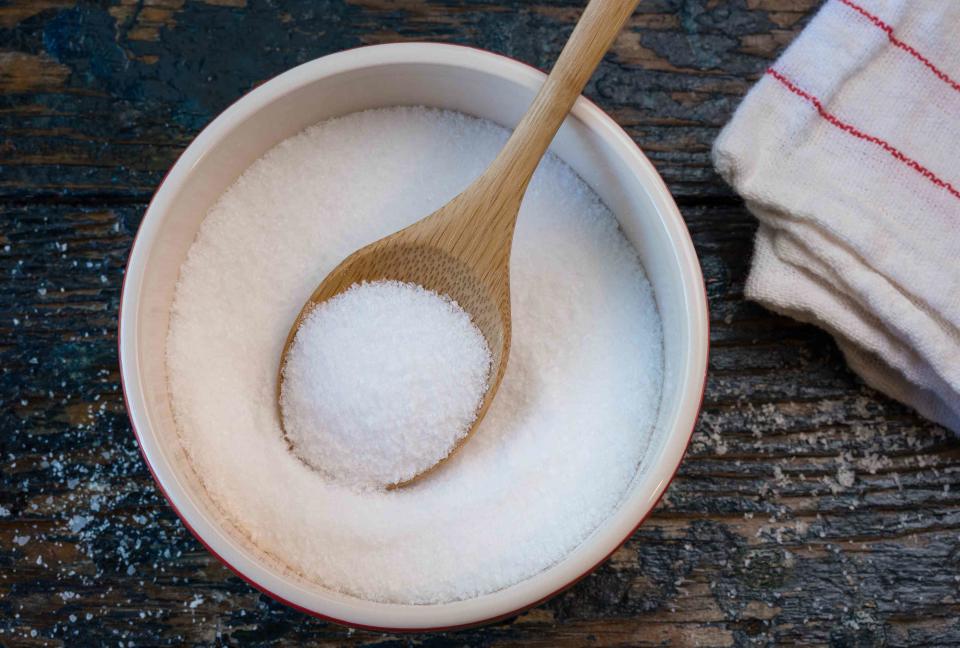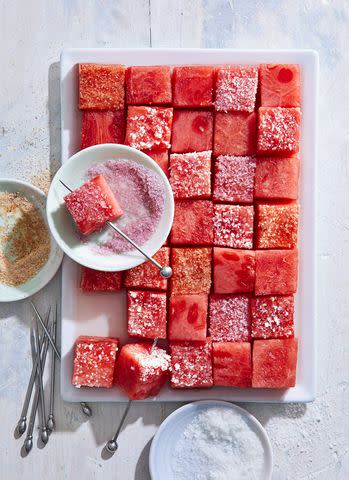What Is Kosher Salt? And When Should You Use It?
With a coarse, flaky texture and clean taste, kosher salt is an ideal everyday seasoning agent.

Any cook worth their salt knows the importance of, well, salt. And these days, many home cooks and professional chefs alike prefer kosher salt as their go-to form of this essential seasoning. But what exactly is kosher salt, and when should you use it over other types of salt? Read on for our guide to kosher salt, including a few of our favorite ways to use this versatile pantry staple.
Related: Why People Are Taking Celtic Sea Salt With Their Daily Water
What Is Kosher Salt?
Peruse the baking aisle in your local grocery store today and you’ll be met with a range of different types of salt, from classic table salt to kosher salt to sea salt to pink Himalayan salt, just to name a few. Yet kosher salt has emerged as a favorite everyday seasoning due to its availability, versatility, and reliability. So, what is kosher salt? Kosher salt is a type of sea salt or mined salt with coarse, irregular grains that are smaller than those of a flaky finishing salt, yet larger and coarser than the table salt you’d find in a shaker.
“Kosher salt has come to be associated with a consistent type of crystal size, a medium-sized salt crystal,” says Ben Jacobsen, founder of Jacobsen Salt Co., which produces a variety of salts harvested from Netarts Bay on the Oregon Coast. “However, different manufacturers’ kosher salts are different—Jacobsen’s kosher salt is different from Morton kosher salt, which is different from Diamond Crystal kosher salt. Kosher salt has almost become a brand in and of itself, even though it differs greatly amongst different manufacturers.” Each manufacturers kosher salt will have subtle differences in flavor, saltiness level, and volume. For example, because of it's larger salt grains, you'll need about 1.5 times as much Diamond kosher salt in recipes as you would Morton kosher salt.
Unlike table salt, kosher salt typically does not contain iodine or other additives (though some brands do contain an anti-caking agent), which many credit with giving it a cleaner, purer flavor. At Jacobsen, kosher salt is produced using the exact same process as the company’s larger flake finishing salt.
“The kosher salt that we produce is not inherently different from our large flake finishing salt, aside from flake size,” Jacobsen says. “Our flake salt is just a larger flake of salt. Our kosher salt comes out of the exact same pans that our flake salt does; it’s just harvested from our salt pans after a different period of time.”
Why Is It Called Kosher Salt?
Despite what the name would imply, not all kosher salt is certified kosher. Rather, kosher salt gets its name from the Jewish tradition of koshering meat with salt, in which salt is used to draw blood and moisture out of meat and poultry. Because kosher salt crystals are slightly larger and coarser in texture than table salt, they adhere more easily to meat and coax out moisture faster.

When to Use Kosher Salt
Kosher salt is not as dense as table salt—because the two have different sized granules, they cannot be used interchangeably. But many professional chefs and recipe developers say they prefer using kosher salt because its large, coarse flakes make it easier to handle than table salt, reducing the risk of over-salting a dish. While flake salt is best used to add texture in the finishing stage of a dish, such as a sprinkle of salt over these decadent chocolate bites, kosher salt can be used in a variety of applications in everyday cooking. Use kosher salt when seasoning, roasting, brining, pickling, baking or even just boiling water for your favorite pasta recipe.
Jacobsen says kosher salt can be used for “anything and everything,” from soups to salad dressings to grilled meats and vegetables. Use kosher salt to pull together your next barbecue rub or rim the glass of a Margarita, and see how even a small dose can magnify the sweetness of fresh watermelon.
Kosher Salt Substitutes
You can substitute table salt, sea salt, or any other variety of salt for kosher salt. For salts with a flaky grain, you should be able to substitute them at a 1:1 swap. However, the key is to start with just a small amount and add a little at a time until you've achieved your desired salt level. In baking, table salt is often called for.
Related: Can I Skip Salt in a Recipe by Using Salted Butter?
How to Store Kosher Salt
Kosher salt should be stores in a cool, dry place in a sealed container. You can also store kosher salt in the packaging it came in, as long as it keeps moisture out.
Frequently Asked Questions
Can you use pink Himalayan salt instead of kosher salt?
Yes, you can substitute pink Himalayan salt for kosher salt. Start with slightly less than a 1:1 ratio and increase salt gradually to taste.
Can you use iodized salt instead of kosher salt?
Table salt tends to be saltier than kosher salt. A good rule of thumb is a radio of 1:2, table salt to kosher salt. Start with less and adjust the seasoning to taste.
For more Better Homes & Gardens news, make sure to sign up for our newsletter!
Read the original article on Better Homes & Gardens.

